Voices from Guilford College’s Sustainable Food Systems Program
May we look upon our treasure, the furniture of our houses, and our garments, and try to discover whether the seeds of war have nourishment in these our possessions.—John Woolman
Seeds for Reconciliation and Resilience
Since the early 2000s, sustainable food systems programs have proliferated across the landscape of higher education. While Guilford College’s farming history reaches back to the institution’s founding in 1837, the current farm was re-established in 2011, with affiliated academic programs in sustainable food systems launched in 2015. The original farm was important to the college community’s survival and sustenance through both the Civil War and the Great Depression. The adjacent woodlands served as an important site of refuge for enslaved persons seeking freedom through the Underground Railroad network, and provisions from the farm likely nourished freedom-seekers along this journey.
Among the distinctions of Guilford College’s current program are its continued grounding in the Quaker tradition, including the influential legacies of abolition and nonviolence. These values inform our farm and degree program’s commitment to food justice and our responsibility to ensure the health and well-being of our human and non-human community members.
The current farm has grown to include several ancillary programs: including a CSA; a mobile market; community garden development partnerships; and, of course, continuing educational programming and support. Through both extended applied research and coursework, the Guilford College Farm is actively building an open-source germplasm collection featuring culturally significant and climate-adapted crop varieties. This includes both seeds and scionwood (cuttings for grafting trees) from regionally adapted apple and peach varieties, heritage collard greens and pre-colonial corn varieties, and fruit and vegetable varieties that are culturally important to recent immigrants and refugees who have settled in North Carolina. Besides their educational value for Guilford students, it is our hope that our collections become a commonly utilized, free resource for reconciliation and resilience in our greater community food system.
Through the following vignettes, members of Guilford’s Sustainable Food Systems community discuss the ways our Quaker heritage shapes current efforts in food justice, seed stewardship, and the spiritual dimensions of food and farming.
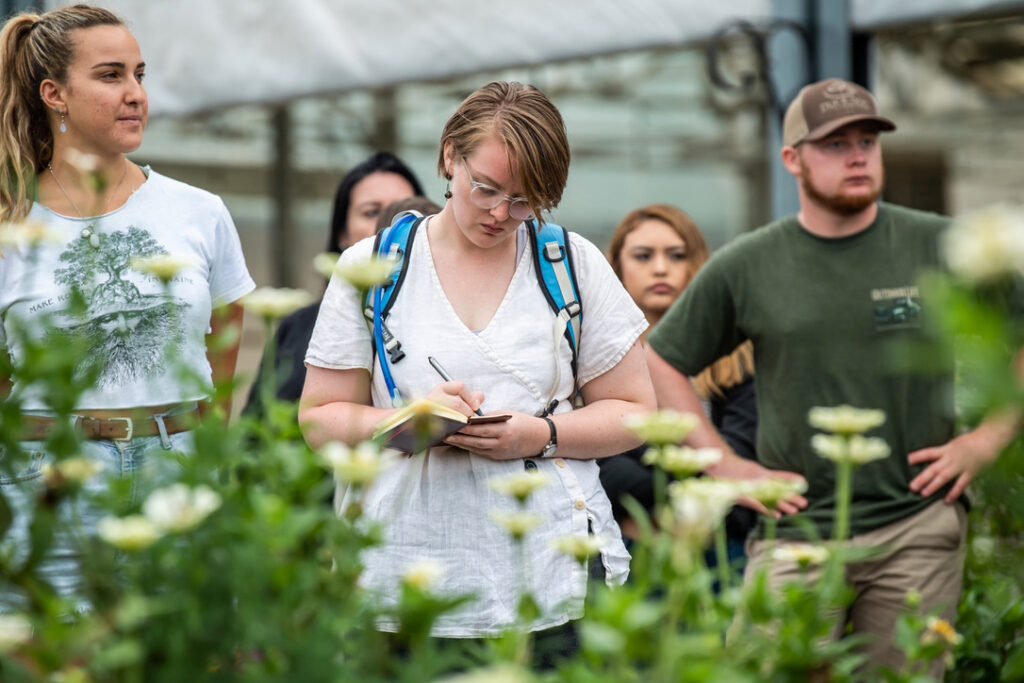
Bronwyn: A Course on Food & Faith
When my department chair called in fall of 2018 requesting that I add another course to my offerings, I was on maternity leave with my second child. Slightly overwhelmed by the life my husband and I were leading on a diversified working farm—while both maintaining full-time careers—I knew my energy expenditures needed to be strategic and thoughtful. Slipping into silence and prayer, I reflected upon the idea of being fueled by my work, rather than it taking anything extra away from my already extended self. Without knowing the vast world that already existed around this topic, “Food and Faith” sprang forth as a clear focus for what I needed to uplift not only in myself but for a program that I knew drew students for more reasons than vegetables.
For me, the simple beauty of fresh produce or a beloved garden strikes something deep within me. Even when one understands the science behind it, the growth of the foods we eat seems like a miracle. When I show my young child a tomato seed, he must trust me when I tell him that come summer, this tiny speck will yield many juicy tomatoes. How can that be? Small steps and patience: water, healthy soil, sunshine, and trust; and in my greenhouse, classical music.
Similarly, it takes trust and patience—some might say faith—to make growth as individuals and communities. In her writing Science and Health with Key to the Scriptures, Mary Baker Eddy pronounced: “What we most need is the prayer of fervent desire for growth in grace, expressed in patience, meekness, love, and good deeds.” Quaker tenets assure us that the Inward Light, like a seed of God, is present within all people. Sometimes we may not see the promised brilliance of others or feel anything lit within ourselves.
But we must trust nonetheless, and nurture whatever spark is present with compassion and a curiosity that leads to understanding and connection. I have found food to be another, often quicker, pathway toward finding this common ground. Food is a connector. All food has a story. That story is one that can bring groups of people together more meaningfully than almost anything else. I wanted to see more of my classes make room for these stories that lessen our divides and highlight where we share in our humanness. A class focused on food and faith seemed like a great place to start.
In our Food and Faith class, we start the semester by asking students to illustrate (literally draw on paper) and orally describe a specific meal that was meaningful to them. It’s telling that the actual food has rarely been the focus of anyone’s anecdote.
Instead, special people, conversations, emotions, generosity, and joy are highlighted. When we share a meal, we are building trust. Research published in the Journal of Consumer Psychology demonstrated that eating the same type of meal as another person “promotes trust and cooperation.” I have found that in classes where we eat together, especially when we prepare meals together, conversations are elevated, and our relationships share a distinctly stronger bond. When we help create a meal, either through the cultivation or preparing of food, we are giving nourishment to others and ourselves.
Beyond biological nutrition, we are also feeding our spirit when we share in food’s delight. We become contributors again in a world that has stripped this offering away from our tool belts and aprons through the guise of convenience and specialization. Wendell Berry writes in The Gift of Good Land:
The ability to be good is not the ability to do nothing. It is not negative or passive. It is the ability to do something well—to do good work for good reasons. In order to be good, you have to know how—and this knowing is vast, complex, humble and humbling; it is of the mind and of the hands, of neither alone.
As Thomas Merton says in Seeking Paradise: The Spirit of the Shakers:
Cutting wood, clearing ground, cutting grass, cooking soup, drinking fruit juice, sweating, washing, making fire, smelling smoke, sweeping, etc. This is religion. The further one gets away from this, the more one sinks in the mud of words and gestures. The flies gather.
My hope is that through our Sustainable Food Systems program, we enliven our students’ taste buds and hands so they can be re-skilled, and keep finding more ways they can provide for the world. We all have so much to offer, and food is just one, beautiful way to give of ourselves.
Wess: Food is a Doorway into the Rest of Life
Food is a doorway. One of the key lines early in our class is “[f]ood is more than fuel.” We learn about the degradation of food as something fast and to be consumed: fuel for the body and nothing more. Yes, it is essential as fuel for our bodies (anyone undernourished knows this), and we would quickly add that food is a doorway into every other aspect of life. Food is a way into discussions around culture and family, morals, and what we most deeply value. Discussions on food lead us into discussions of the environment, race, class, and issues of poverty and hunger in a country that has more than enough to go around. Food leads us into discussions of the Hebrew Bible; the New Testament; the Qur’an; and many other religious texts, beliefs, and practices that embed food in sacred community. Food inevitably brings up questions of the body and nourishment and starts conversations around disordered eating; body positivity; and the impact of celebrity culture, capitalism, and empire on our physical, mental, spiritual, and emotional well-being. Food is a door into every aspect of human life. Food and faith are inextricably linked.
In Food and Faith, we talk about watersheds and how they connect us and our communities to not just the food that grows, but also to the water we drink and the animals, insects, and the rest of the more-than-human world we share these resources with. Thinking in terms of watersheds helps us remain interconnected in issues of policy and injustice: race and class, land and water, communities and resistance. We think about those up and downstream from us in the Cape Fear River Basin: the impact we have on each other and all of the tangible and intangible ways we are connected.
We similarly draw inspiration and guidance from Rarámuri scholar Enrique Salmon’s concept of “kincentric ecology.” Salmon defines kincentrism as “an adaptation of indigenous perspectives in which humans are understood as part of (rather than apart from) an extended ecological family that shares ancestry and origins.” Salmon writes that kincentrism
is an awareness that life in any environment is viable only when humans view the life surrounding them as kin. The kin, or relatives, include all the natural elements of an ecosystem. Indigenous people are affected by and, in turn, affect the life around them.
The Food and Faith class invites this kind of reflection and imagination. We invite students to reflect on their place in these systems, these watersheds, their communities. What is their story of food and faith throughout their lives? What were the messages they received about both when they were children and as they grew up. What is their philosophy of food and how has the class broadened or changed that? One of our favorite exercises is when students offer a blessing before a meal. The exercise gets them to find the words that reflect their own values around food: whether they are religious or not.
Around this table
We do not look the same
We do not eat the same things
We do not think the same things
But
We were made by the same creator
We are made of the same things
We come here for the same reasons
We are a community
A family
And that is what matters most
—Avery Edward, Guilford College class of 2023
And then of course, as suggested earlier, we make food and eat together. That is hands-down the best part of the class. In all of my years of teaching, I’ve never felt closer to my students than I do when I am with them in our Food and Faith classes when we take time to make and share meals together. Religious communities that have food as an important part of their symbolism, rituals, and practices have been making this point for thousands of years, but to experience the power of breaking bread in this manner—even if the course of a short three-week class—is like witnessing a small miracle.
Tony: Seed Stewardship
My journey as a seed keeper has been transformative: connecting me to generations and communities around the world. These days I maintain a teaching collection of seeds, mostly corn and pulses (American beans, African peas) collected from travels to great centers of agro-biodiversity or grown from seed packets. This collection includes seeds passed on to me from friends, relatives, and community members as well. These include the case knife beans I inherited from my great aunt, the family corn (hickory cane) identified as such by my grandmother and gifted to me from a friend at Seed Savers Exchange, and the whippoorwill cowpeas that unexpectedly kindled a family dialogue about an almost-forgotten regional culinary tradition. These stories and those of countless other varieties we are entrusted to steward and are blessed to share bring the vitality and importance of this practice to life for our students. With Patricia Gish Hill, we ask our students to “[i]magine how the idea of seeds as living entities embedded in the communities that care for them could shift dominant thought, changing our food system and agroecosystem.”
Indian writer and activist Vandana Shiva is often noted for declaring that “seed saving is a political act.” For some of us, including myself, it is also a spiritual practice. For indeed seeds— the mundane, largely taken for granted, spectacularly varied vessels carrying the life-force of the universe from season to season—have been a source of human sustenance and spirituality for millenia. Seed keeping connects us to this deep lineage of human and plant relatives, an embodiment of a co-evolutionary dance of mutuality and interdependence. Many of these seeds encapsulate deeply situated biocultural adaptations to place as well: manifestations of both highly specific eco-climatic conditions and equally distinct cultural preferences. In many cases, seeds and the crops they yield are central to cosmological understandings of the human place in the larger web of life.
Many Indigenous peoples of the Americas understand themselves as descendants of maize and other plant relatives. In such a vision of the cosmos, the seeds by which maize is perpetuated from year to year are not just biological objects but are sacred ancestors bound to humans in cycles of reciprocity and mutual reproduction. For indeed, as scholar Roberto Gonzalez writes in Zapotec Science: “Humans produced maize, but maize also produced human societies.”
In the global, industrial food system, however, seeds have become subject to privatization and standardization, both of which threaten the biocultural inheritance of all humanity, as well as the dazzling diversity that traditional seed varieties represent. The Food & Agriculture Organization of the United Nations estimates that since 1900 around 75 percent of crop genetic diversity has been lost globally. This is a process that has resulted in the displacement of locally developed landrace varieties (highly adapted to local growing conditions) with more genetically uniform varieties controlled by increasingly consolidated multinational seed companies, often with restrictive patents that prohibit seed saving. This represents an incalculable loss that narrows our collective capacity to respond to the challenges of climate change, as it simultaneously reduces the cultural richness built over millennia of human-plant interaction tended in fields and hearths across the planet.
In a larger global context in which corporate actors seek to enclose this seed “commons,” converting the age-old, community-based practices of seed saving and exchange to monopolized commodities, seed conservation for community resilience becomes increasingly important. It is simultaneously a political act and a sacred duty.
Epilogue
Whether it is through a scientific, psychological, or spiritual lens—or all of the above—food and the growing of it is a proven connector. It ties us to our past, helps us understand the land, and links us to one another. It’s rare for one person or family to be able to fully provide for all of their dietary needs. We must rely on others, like neighbors, our community farmer, or maybe the global community to supply us with the missing pieces. Similarly, intentionally facing and shaping our own part in the relationship we have with food can alter the way we treat each other and the land. Rowen White of Sierra Seeds shares:
I believe that cultivating a culture of belonging needs to be at the heart of food systems change, inviting a diversity of perspectives and voices, cosmologies and values. I believe that food is deeply healing and that when we restore our relationships with our ancestral foods, they help us recalibrate our deep internal knowing of who we are, and this is one of the greatest anecdotes to the diaspora of disconnection that is creating so much ecological and social chaos in these time.
In a time of many unknowns and many “fences” that need mending, food can be a peace offering that brings us closer to harmony, bit by bit . . . or bite by bite.


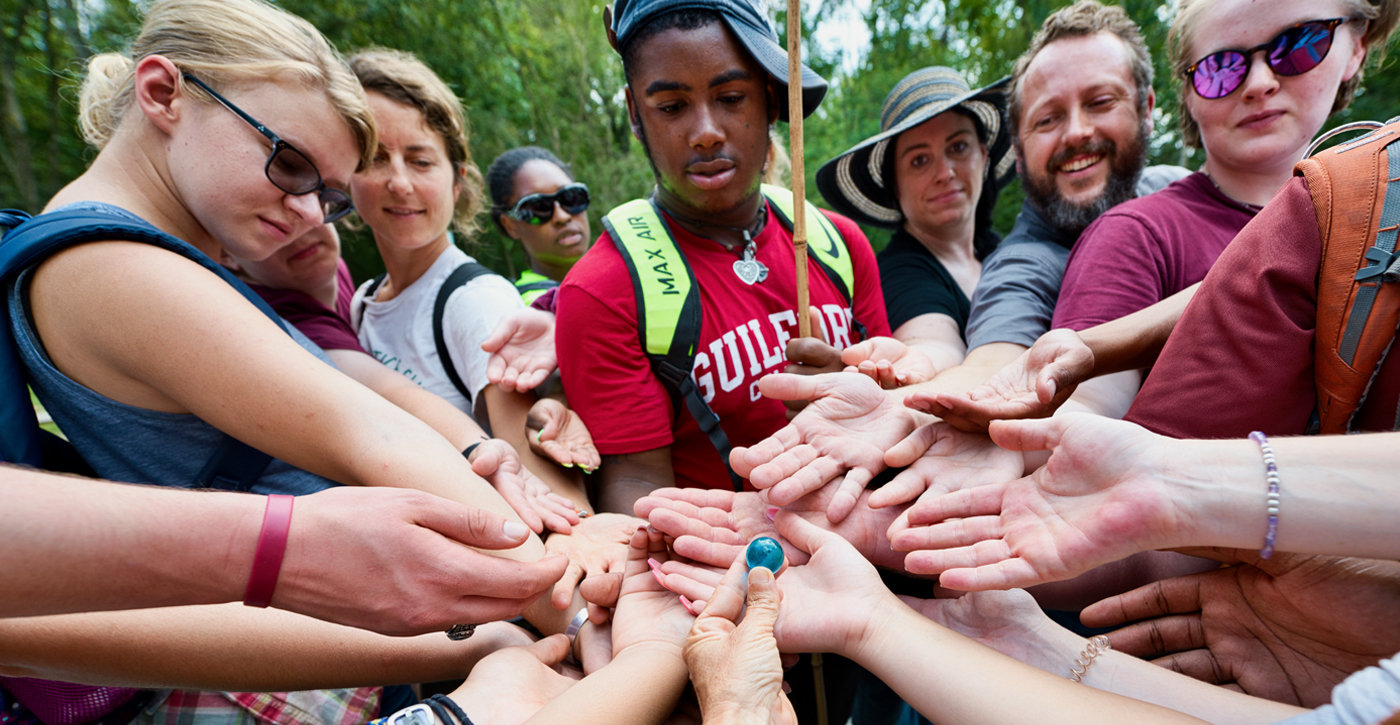
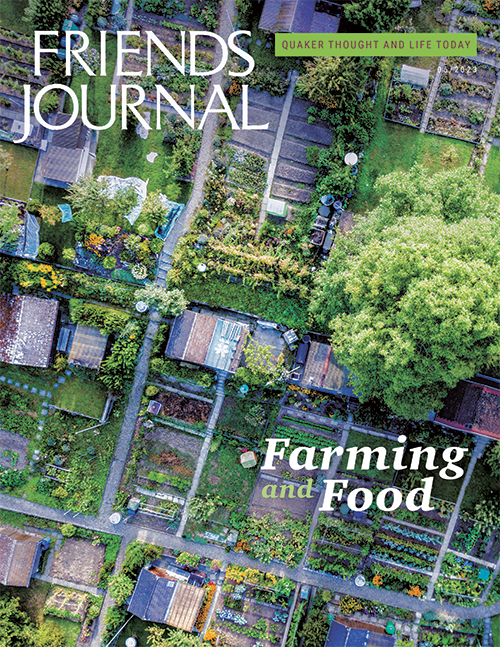
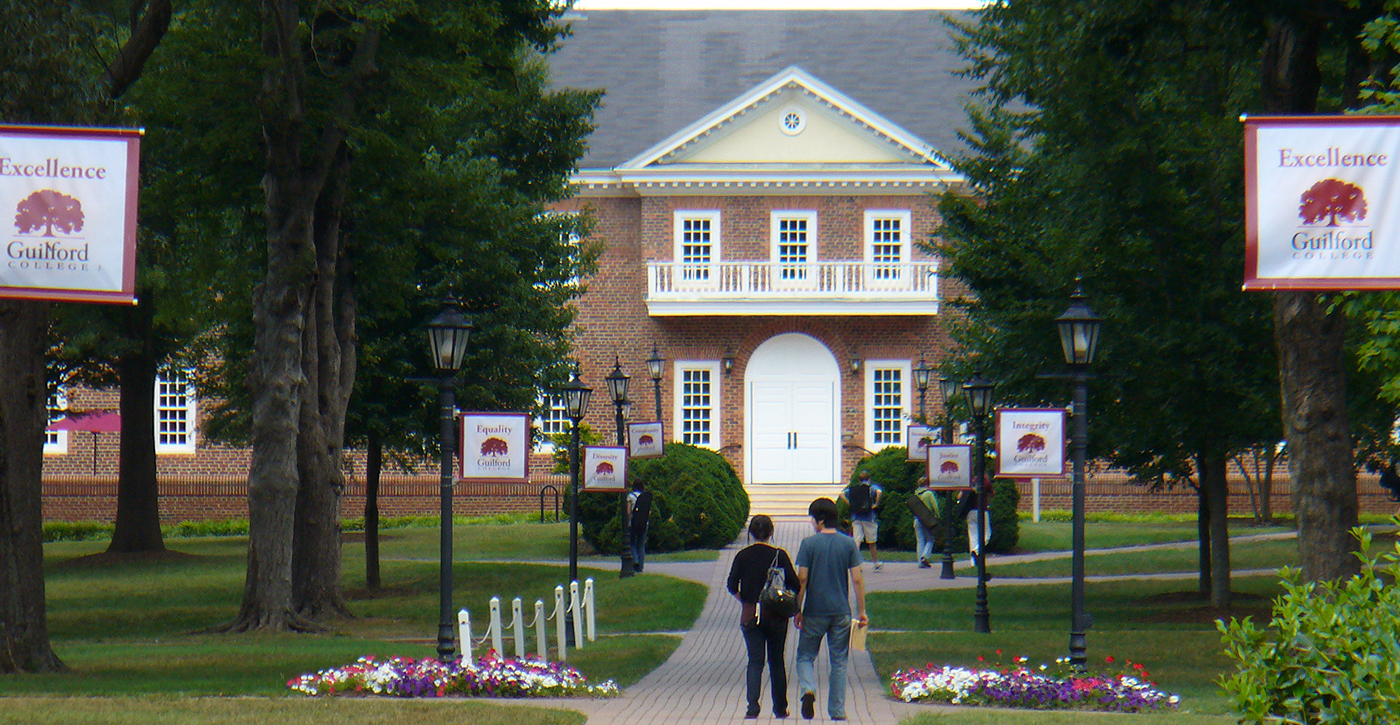
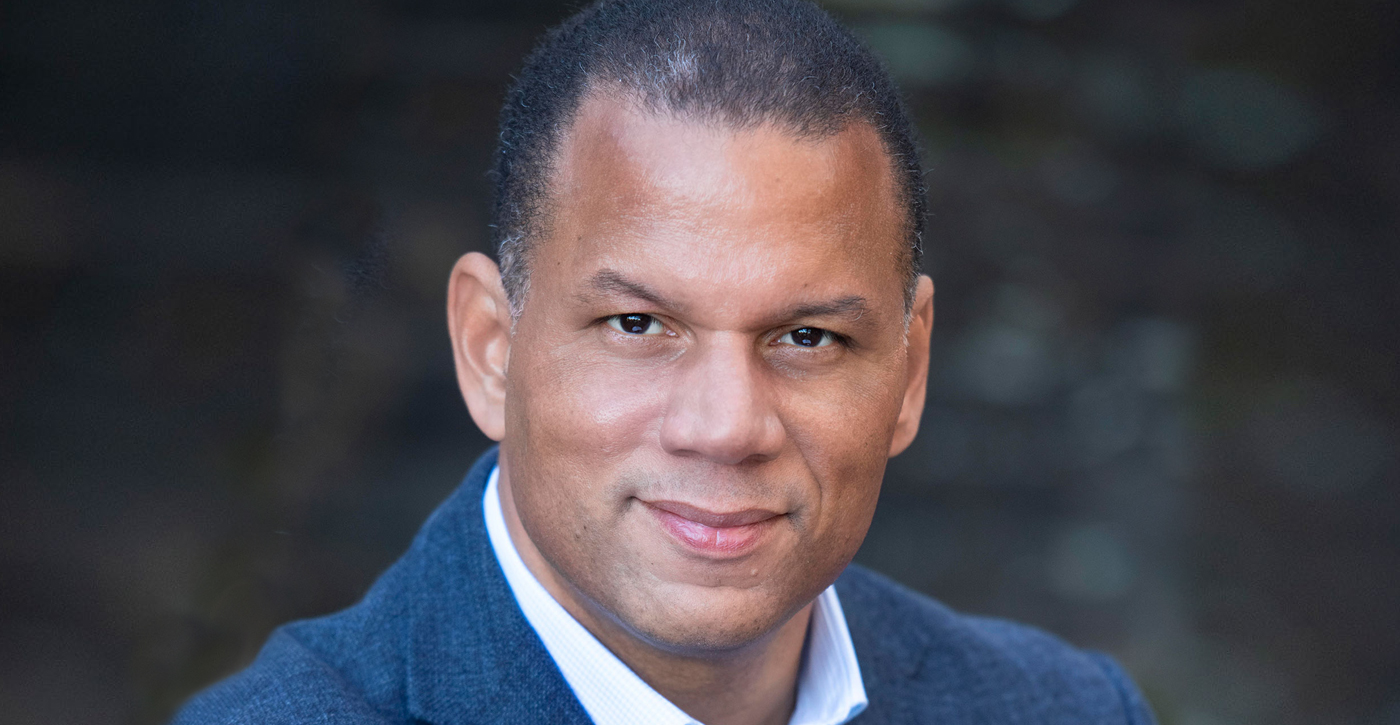
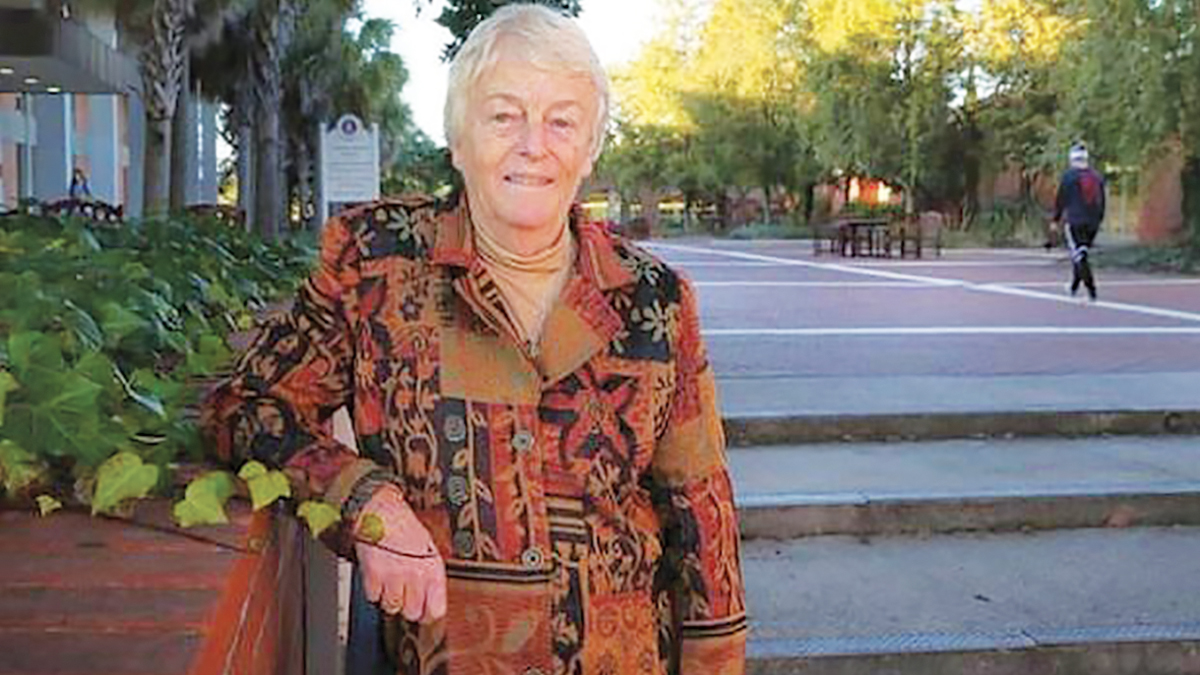
Comments on Friendsjournal.org may be used in the Forum of the print magazine and may be edited for length and clarity.